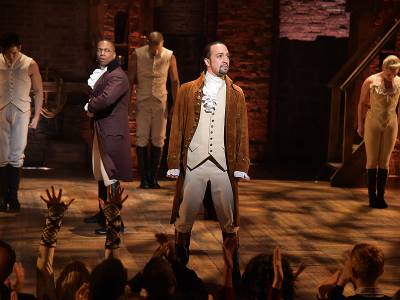
This is a follow up to the blog on “Passion” (http://www.dantranscon.com/index.php/blog/entry/passion ) that was posted here a few weeks ago and is published in the current issue of Canadian Shipper. While the blog on Passion was inspired by Bernie Sanders, this blog was inspired by Lin-Manuel Miranda, the author and star of the hit Broadway play “Hamilton.”
On Sunday night, during an interview on Sixty Minutes, Lin-Manuel and his parents were asked by Charlie Rose about their son’s early school experience. Mr. Miranda mentioned that he was sent to a school for gifted children. At first he felt intimidated by the school and the intelligence of his fellow class mates. Mr. Miranda then mentioned that once he found “his lane,” or calling at the school, Music, he felt totally comfortable with the institution and his career path.
Hamilton, based on the life of former U.S. treasury secretary, Alexander Hamilton, is the hottest play on Broadway. On Sunday night it earned 11 Tony awards, the second best performance ever for a new play. Mr. Miranda created a brilliant hip-hop musical to tell this story. Some critics are calling Hamilton a trans-formative play that will have lasting effects on the future of Broadway.
Lin-Manuel Miranda was very fortunate to find his “lane” as he described it. Not everyone does. It is interesting that by finding his lane, Mr. Miranda was able to reach extraordinary heights in his career. Here are some thoughts on the key steps in finding a successful career lane.
First, it is very important for parents to expose their children to different fields of study at an early age so as to allow them to find and then explore their options. Second, it is helpful to study the preferred lane to make an informed decision on whether or not to pursue a particular area as a career opportunity. Specifically, three of the key questions that need to be asked at this stage are would I have a passion for working in this space, whether this field has significant employment prospects and whether it has the potential for good financial rewards. As part of this exercise, kids should be asked to carefully assess their interest in a variety of potential career lanes.
Not every parent can put their children through university or trade school. Not every child can make a determination with certainty, at a young age, on their preferred career path before making an investment in time and money.
Third, it is clear that Mr. Miranda worked hard to take his musical talents to an exceptional level. He had to be remarkable to be given the opportunity to write a very innovative musical play for Broadway. It took him over 5 years to write Hamilton. There is no substitute for hard work to achieve success in any chosen career path.
Fourth, an individual must find a company that will afford him or her, an opportunity to apply his or her skills. This is particularly true in the current environment where good jobs are hard to come by. As a result, individuals, at the outset, may need to take on junior or part time roles to enhance their experience and bolster their resumes as they try to gain full time entry into their “lane.” Networking skills and luck can play a big part in this process.
Finally, when the opportunity presents itself, it is critical to surround oneself with great mentors, leaders and colleagues so as to maximize the chances for success. Judging by the number of awards won by other members of the Hamilton cast, it is clear that Mr. Miranda and his collaborators assembled a very talented group of artists who all are of an exceptional caliber.
Broadway is a competitive field as is law, medicine, trucking, sports or mechanical engineering. Finding success in one’s lane demands that one follow each of these steps. Lin-Manuel Miranda serves as a very positive role model.
To stay up to date on Best Practices in Freight Management, follow me on Twitter @DanGoodwill, join the Freight Management Best Practices group on LinkedIn and subscribe to Dan’s Transportation Newspaper (http://paper.li/DanGoodwill/1342211466.



















